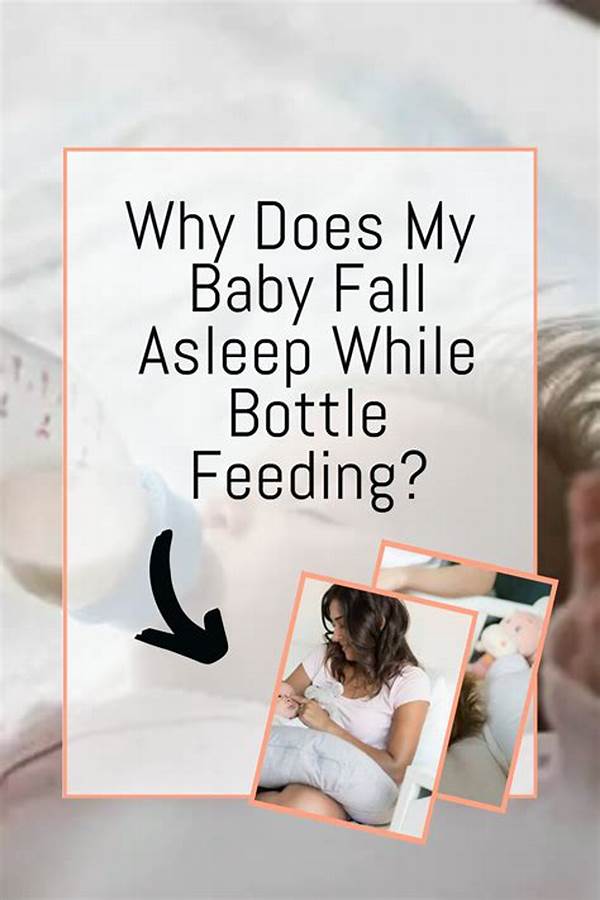Avoid Letting Babies Fall Asleep on Feeding or Holding
Read More : Baby Sleep Day March 1 Raises Awareness For Good Night’s Sleep
In the profound journey of parenting, where every choice shapes your baby’s future, understanding the significance of each decision is pivotal. One of the subtle yet impactful choices involves how infants fall asleep. New parents often grapple with whether to let their babies drift off during feeding or while being held. Although it may seem harmless, encouraging this habit can lead to unintended challenges. The aim of this article is to highlight why you should avoid letting babies fall asleep on feeding or holding, emphasizing optimal practices for nurturing independent sleeping habits in your newborn. Using insights from experts, real-life stories, and a dash of humor, this narrative unfolds the unseen effects of these habits and unveils practical solutions for the vigilant parent.
Babies, as adorable as they are, come with their set of challenges. Have you ever wondered why your little one stirs awake the moment you try to place them in the crib after they have fallen asleep on you? It’s like they have a hidden radar! This age-old parenting dilemma might have more to it than meets the eye. As comforting as it is for both parents and babies, letting your child doze off while feeding or holding can create dependencies that might lead to sleep issues later in life. Even more, allowing such habits might keep you trapped in an exhausting cycle of round-the-clock nurturing. Imagine a world where your baby falls asleep independently—a scenario every parent desires, right?
Why break the cycle, you ask? Well, developing a consistent sleep routine where babies fall asleep in their crib can foster self-soothing behaviors. By avoiding letting babies fall asleep on feeding or holding, you lay the foundation for peaceful nights and well-rested days. Indeed, this practice can be your unseen ally in nurturing a more adaptable and self-reliant child. Be the parent who embraces the art of strategic detachment—it’s about equipping your little one to thrive with growing independence while you enjoy a well-deserved break, guilt-free!
Creating Healthy Sleep Habits for Your Baby
Description
Navigating the rocky terrain of parenting, one quickly learns the value of instilling healthy habits early on. In particular, sleep habits can dramatically affect your baby’s development and your sanity. Establishing a routine where your infant can fall asleep in their own sleeping environment without depending on feeding or holding is key.
In the warm cocoon of safety that parents provide, infants find solace, and it’s natural for parents to cherish these moments. However, research indicates that allowing babies to sleep on feeding or holding can prolong nighttime awakenings. After all, who doesn’t want to dodge the middle-of-the-night musical, ‘Let Me Fall Asleep Again’? Developing a strategy that avoids letting babies fall asleep on feeding or holding empowers little ones to become comfortable with their own sleep space. This self-reliance promotes longer sleep durations and supports balanced, autonomous growth.
A pivotal segment of sleep hygiene is modification through routine. Establishing sleep schedules and cutting out feeding-to-sleep associations right from the start is beneficial. Based on pediatric investigations, consistent sleep rituals can soothe your infant into slumber without the need for external comfort mechanisms. Parental anecdotal evidence sings praises of this method—imagine a realm where your child dozes off without any rocking or everlasting lullabies in the background!
But wait, there’s more to unwrapping the sleep enigma than purely routine-driven strategies. A touch of parental instinct infused with flexibility is crucial too. Always remember that your child’s comfort and emotional needs come first—it’s about finding that balance. Through this balanced approach that avoids letting babies fall asleep on feeding or holding, parents can witness a gradual yet rewarding change in their child’s sleeping pattern, creating a serene atmosphere for everyone.
Benefits of Encouraging Independent Sleep
Delving into the world of sleep training, parents often encounter two distinctive schools of thought: one advocating for independence and the other for attachment. While attachment-centered practices have their deserved place, fostering independent sleep should not be overlooked either. Babies have an innate ability to sleep independently if gently nudged in that direction. Avoid letting babies fall asleep on feeding or holding to encourage their natural knack for self-reliance. This approach not only ensures sound sleep today but also fortifies resilience in facing tomorrow’s challenges. Consider it like teaching them the art of crochet—an intricate weaving of self-assurance into the fabric of life.
Now, you might wonder about the specifics—where does one embark on this intriguing parenting journey? It starts right here, right now, by making a mindful decision. Understanding the delicate dance between nurturing touch and promoting individuality holds the key. Crafting a consistent bedtime routine that veers away from feeding or holding pacifies the parent and empowers the child. As heartwarming as these old habits are, remember that by fostering an independent sleeping environment, you are gifting lifelong benefits.
How to Introduce Independent Sleep Habits
Training a baby for independent sleep doesn’t imply abandoning comfort. It’s a gradual shift facilitated with care, empathy, and strategic actions. Let’s embrace effective sleep strategies designed to support resilient sleep habits suitable for you and your child. From introducing a cozy sleep environment to experimenting with self-soothing techniques, each step holds significance. Research suggests babies who skillfully master this balance tend to become well-adjusted and emotionally stable adults. Through shared wisdom and expert guidance, parents can now actively avoid letting babies fall asleep on feeding or holding, shaping a future as resilient as it is restful.
